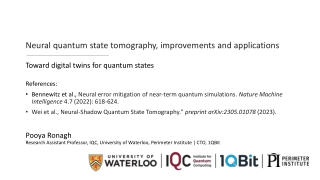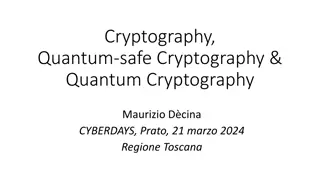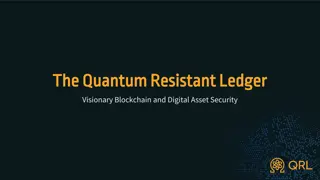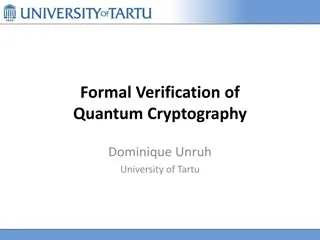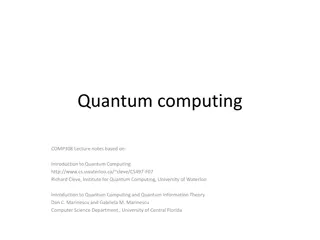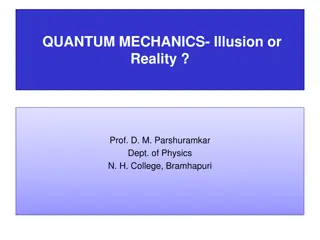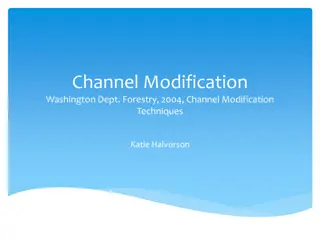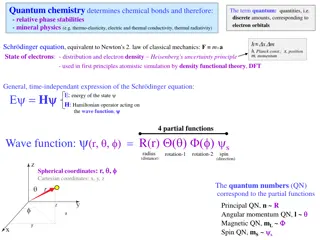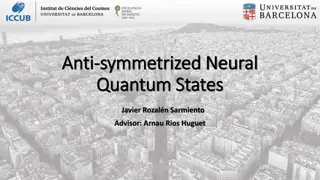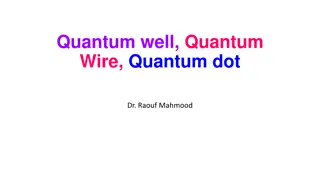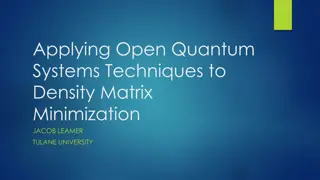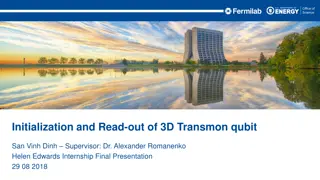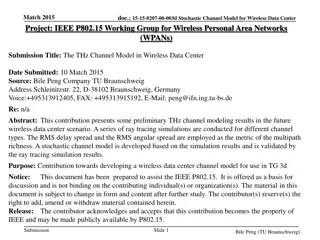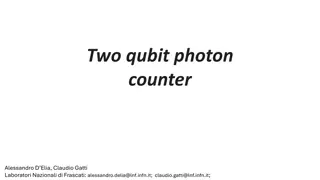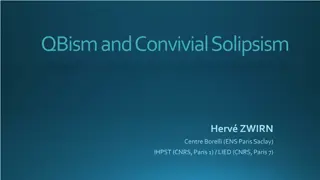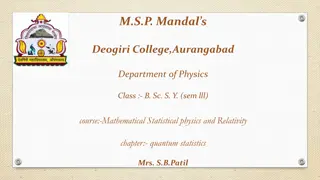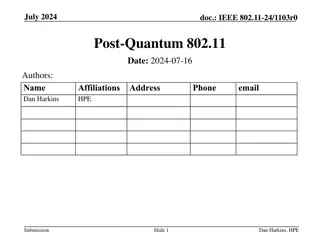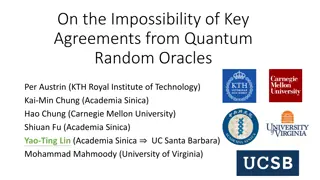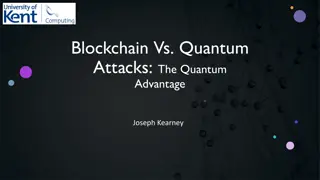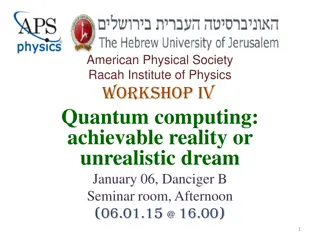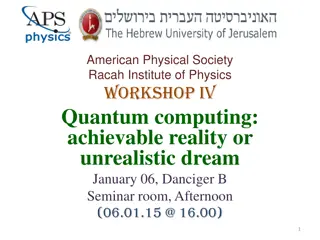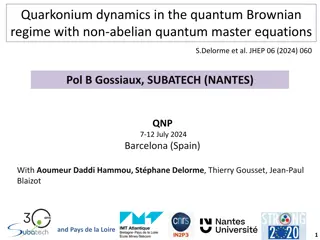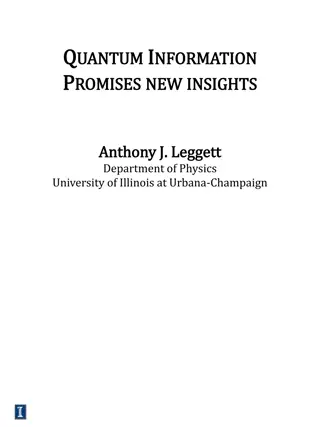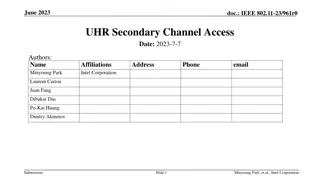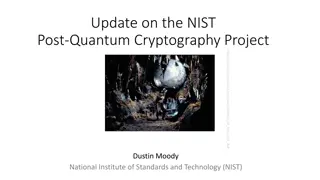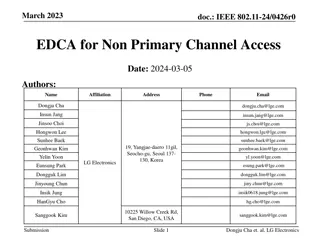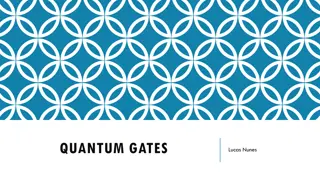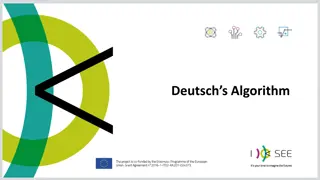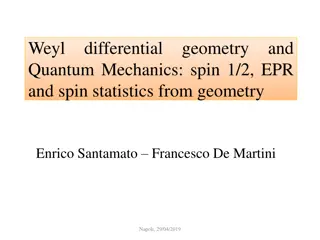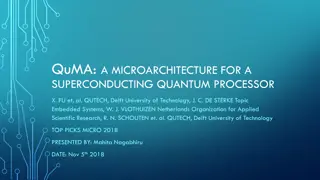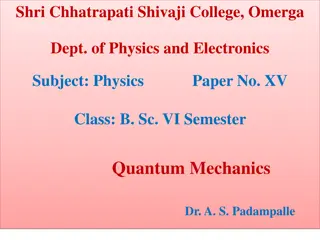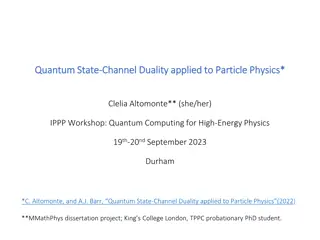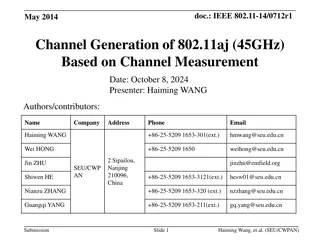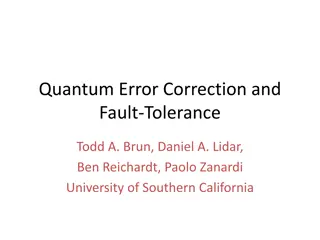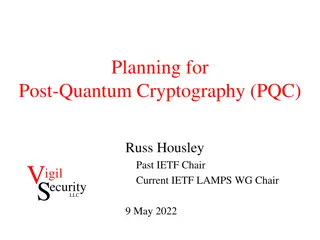Neural quantum state tomography, improvements and applications
Advancements and potential applications of neural quantum state tomography, aiming to reduce the exponential classical memory required for expressing quantum states. It discusses the benefits of using machine learning techniques to process and analyze quantum data, such as cleaning up states, manipu
4 views • 26 slides
Channel Design
Channel design involves creating a plan for the efficient distribution and movement of products and services from the producer to the customer. This process includes determining the channel flow, identifying channel members, setting channel objectives, and developing a channel strategy.
0 views • 13 slides
Understanding Channel Design in Marketing
Channel design involves planning the distribution of products and services from producers to customers through different business entities or individuals. It encompasses elements like channel flow, channel members, objectives, alternatives, and strategy. Successful channel design aligns with busines
0 views • 13 slides
Cryptography,.Quantum-safe Cryptography& Quantum Cryptography
Dive into the world of cryptography, quantum-safe cryptography, and quantum technology as discussed in Maurizio D. Cina's presentation at CYBERDAYS in Prato. Topics include current cryptosystems, post-quantum cryptography, quantum key distribution, and future cryptosystems based on quantum algorithm
4 views • 17 slides
CERN Quantum Technologies Initiative Overview
The CERN Quantum Technologies Initiative (QTI) aims to explore the impact of quantum technology on CERN's physics programs. This phase involves identifying key areas for collaboration, conducting scientific investigations, and building quantum capacity. The strategy and roadmap were developed with i
6 views • 14 slides
Addressing The Quantum Threat: The Quantum Resistant Ledger
The Quantum Resistant Ledger (QRL) is a visionary blockchain and digital asset security solution designed to counter the emerging threat of quantum computing. With quantum technology advancing and traditional blockchains at risk, QRL offers an industrial-grade, quantum computer-resistant cryptocurre
2 views • 9 slides
Formal Verification of Quantum Cryptography by Dominique Unruh
Explore the significance of formal verification in quantum cryptography as discussed by Dominique Unruh from the University of Tartu. Understand the challenges, motivations, and current work in verifying quantum crypto protocols, and the potential impact of quantum computers on common encryption met
0 views • 25 slides
Introduction to Quantum Computing: Exploring the Future of Information Processing
Quantum computing revolutionizes information processing by leveraging quantum mechanics principles, enabling faster algorithms and secure code systems. Advancements in quantum information theory promise efficient distributed systems and combinatorial problem-solving. Discover the evolution of quantu
0 views • 68 slides
Near-Optimal Quantum Algorithms for String Problems - Summary and Insights
Near-Optimal Quantum Algorithms for String Problems by Ce Jin and Shyan Akmal presents groundbreaking research on string problem solutions using quantum algorithms. The study delves into various key topics such as Combinatorial Pattern Matching, Basic String Problems, Quantum Black-box Model, and mo
0 views • 25 slides
Exploring Quantum Mechanics: Illusion or Reality?
Delve into the fascinating realm of quantum mechanics with Prof. D. M. Parshuramkar as he discusses the contrast between classical and quantum mechanics. Discover how classical mechanics fails to predict the behavior of electrons in atoms and molecules, leading to the development of quantum mechanic
0 views • 70 slides
Successful Channel Modification Techniques and Benefits
Channel modification projects aim to accelerate the recovery of stable, sustainable channel forms in dynamic balance with sediment, large wood, and flow regimes. Successful modifications lead to improved habitat quality, stability, and diversity, benefiting sediment transport and riparian zones. Phy
0 views • 15 slides
Understanding Quantum Chemistry and Electron Orbitals
Quantum chemistry plays a key role in determining chemical bonds, phase stabilities, and mineral physics through the study of electron orbitals, quantum numbers, and energy levels. This involves concepts such as the Schrödinger equation, quantum quantities, and the uncertainty principle. The arrang
0 views • 31 slides
Exploring Neural Quantum States and Symmetries in Quantum Mechanics
This article delves into the intricacies of anti-symmetrized neural quantum states and the application of neural networks in solving for the ground-state wave function of atomic nuclei. It discusses the setup using the Rayleigh-Ritz variational principle, neural quantum states (NQSs), variational pa
0 views • 15 slides
Effective Channel Management Decisions for Marketing Success
The success of marketing channels lies in making right channel design decisions and effectively implementing them through channel management decisions. From selecting channel members to training and motivating them, companies must focus on building strong partnerships to drive success in the competi
5 views • 6 slides
Understanding Quantum Wires and Nanowires: Properties and Applications
Quantum wires, quantum dots, and nanowires are essential components in nanotechnology due to their unique properties and applications. Quantum wires are one-dimensional systems with restricted electron movement, while quantum dots are zero-dimensional, limiting electron movement in all dimensions. N
3 views • 12 slides
Advancements in Quantum Systems Techniques for Density Matrix Minimization
Discover the innovative methods and applications of open quantum systems techniques for density matrix minimization. Explore the motivation behind the research, early developments, purification processes, linear scaling potentials, Bloch's method intricacies, quantum channel algorithms, canonical de
0 views • 22 slides
Exploring 3D Transmon Qubits in Quantum Computing
This document delves into the initialization, read-out, and measurement techniques of 3D transmon qubits as integral components of quantum computing. It covers the underlying principles of superconducting qubits, SRF cavity utilization, and the roadmap for improving quantum memory and coherence time
0 views • 12 slides
The THz Channel Model in Wireless Data Center
This contribution presents preliminary THz channel modeling results for future wireless data center scenarios. Ray tracing simulations are conducted for various channel types, utilizing RMS delay spread and RMS angular spread to measure multipath richness. A stochastic channel model is developed and
0 views • 33 slides
Quantum Circuit Simulations and Electromagnetic Analyses in Quantum Photonics
Explore the world of quantum photonics with insights into two-qubit photon counters, jointed cavities, qubit pads, and quantum circuit simulations. Ansys simulations and experimental data by researchers Alessandro D'Elia and Claudio Gatti provide in-depth analysis of quantum phenomena. Discover the
0 views • 7 slides
QBism and Convivial Solipsism in Quantum Interpretations
QBism and Convivial Solipsism present different interpretations of quantum mechanics, focusing on the subjective nature of probabilities and experiences within the quantum formalism. QBism emphasizes the subjective interpretation of probability, considering the quantum state as a tool for assigning
0 views • 30 slides
Development of Quantum Statistics in Quantum Mechanics
The development of quantum statistics plays a crucial role in understanding systems with a large number of identical particles. Symmetric and anti-symmetric wave functions are key concepts in quantum statistics, leading to the formulation of Bose-Einstein Statistics for bosons and Fermi-Dirac Statis
1 views • 15 slides
Post-Quantum Cryptography in IEEE 802.11 - Current State and Future Concerns
Submission discusses the potential impact of post-quantum algorithms on IEEE 802.11 networks, highlighting the necessity to prepare for a post-quantum future. It explores the risks posed by quantum computing to existing cryptographic systems and emphasizes the importance of adopting post-quantum sol
0 views • 19 slides
Quantum Key Agreements and Random Oracles
This academic paper explores the impossibility of achieving key agreements using quantum random oracles, discussing the challenges and limitations in quantum communication, cryptographic protocols, quantum computation, and classical communication. The study delves into the implications of quantum ra
0 views • 29 slides
Understanding Blockchain Vulnerabilities to Quantum Attacks
Explore the vulnerabilities of blockchains to quantum attacks and the potential impact of quantum devices on blockchain technologies. Learn about key concepts such as blockchain basics, proof-of-work, quantum computing, quantum computing algorithms, and vulnerabilities like ECDSA and peer-to-peer ne
0 views • 23 slides
Quantum Computing: Achievable Reality or Unrealistic Dream Workshop
Explore the intriguing realm of quantum computing through insightful lectures by Prof. Gil Kalai and Prof. Nadav Katz at the American Physical Society workshop. Delve into the possibilities, failures, and advancements in quantum information science. Join the discussion on the state-of-the-art develo
0 views • 13 slides
Insights on Quantum Computing: Bridging Theory and Reality
Delve into the world of quantum computing through a series of workshops and personal reflections. Explore the intersection of theoretical concepts with practical applications, highlighting the evolving landscape of quantum mechanics. The journey navigates discussions on electron spin, fundamental th
0 views • 12 slides
Quantum Brownian Regime in Quarkonium Dynamics: Insights and Applications
Exploring quarkonium dynamics in the quantum Brownian regime using non-abelian quantum master equations reveals crucial aspects such as regeneration processes, quarkonia at finite temperature, and distinct regimes based on spectral density and dissociation mechanisms. The study delves into quantum m
0 views • 44 slides
Exploring Quantum Information through Polarization of Photons
Quantum information and photon polarization are explored in this detailed presentation featuring the ultimate quantum 2-state system. The content delves into the behavior of single photons at a quantum level, showcasing the intriguing properties and implications of quantum superposition in polarizat
1 views • 14 slides
Proposal for Improved Channel Access Efficiency in IEEE 802.11 Networks
The proposal addresses the inefficiencies in utilizing secondary channels in IEEE 802.11 networks, aiming to enhance access to wideband channels (>20 MHz) when the primary channel is busy. It introduces a mechanism for APs and STAs to access available secondary channels while the primary channel is
0 views • 7 slides
Understanding Quantum Computing and Its Impact on Cryptography
Quantum computing utilizes the principles of quantum mechanics to process information exponentially faster than classical computers. This advancement poses a significant threat to current cryptographic systems, especially those reliant on factors like RSA and Diffie-Hellman key exchange. If large-sc
0 views • 25 slides
Enhanced Distributed Channel Access (EDCA) for Non-Primary Channel in IEEE 802.11
Discussion on implementing EDCA for Non-Primary Channel Access (NPCA) in IEEE 802.11, focusing on mitigating frame collisions and enhancing medium efficiency. Various considerations for EDCA procedure on the Non-Primary Channel (NPCH) are explored to optimize channel access and reduce wastage. Topic
0 views • 13 slides
Understanding Quantum Computing: Quantum Gates, Bits, and Applications
Explore the world of quantum computing with this detailed guide covering quantum bits, gates, their applications, and the advancements made in the field. From classical bits to qubits, Bell states, and quantum gates, discover the fundamental principles that drive quantum computing forward.
0 views • 37 slides
Understanding Deutsch's Algorithm in Quantum Computing
Deutsch's Algorithm is a fundamental quantum algorithm designed to solve the problem of determining if a given function is constant or balanced. This algorithm leverages quantum principles such as superposition and entanglement to provide a more efficient solution compared to classical methods. By e
0 views • 17 slides
Quantum Mechanics and Geometric Interpretations in Weyl Space
The discussion explores Weyl quantum mechanics, Bohm's interpretation of quantum potential, and geometric formulations in Euclidean-Weyl space. It delves into the implications of nonlocal quantum potentials and the nature of metric spaces in shaping quantum phenomena. Concluding with alternative vie
0 views • 30 slides
Overview of QuMA: A Microarchitecture for a Superconducting Quantum Processor
This paper introduces QuMA, a quantum microarchitecture that bridges the gap between high-level algorithms and the quantum physical layer. It defines a multi-layered system stack for quantum computers, focusing on compiler support, quantum error correction, and the need for a micro-architecture fram
0 views • 21 slides
Unveiling the Quantum World: Understanding Blackbody Radiation and Quantum Mechanics
Quantum Mechanics emerged between 1900 and 1930 as a revolutionary theory explaining the behavior of microscopic particles. This article delves into the need for Quantum Physics due to classical mechanics' limitations, focusing on Blackbody Radiation and laws governing it like Wiens Displacement Law
0 views • 30 slides
Exploring State-Channel Duality in Quantum Physics for High-Energy Colliders
Delve into the intriguing concept of State-Channel Duality in quantum information theory applied to high-energy particle physics processes. Discover how quantum channels connect density matrices of particle physics states and their implications for future colliders and quantum computing implementati
0 views • 26 slides
Channel Generation Process for IEEE 802.11aj (45GHz) Based on Channel Measurement
This presentation by Haiming Wang and team from SEU/CWPAN discusses the process of channel realization and generation in the 45 GHz bandwidth. It covers the generation of the channel impulse response, modeling of parameters, statistical measurements, and future work related to the 802.11ad standard.
0 views • 27 slides
Quantum Error Correction and Fault Tolerance Overview
Quantum error correction and fault tolerance are essential for realizing quantum computers due to the challenge of decoherence. Various approaches, including concatenated quantum error correcting codes and topological codes like the surface code, are being studied for fault-tolerant quantum computin
0 views • 19 slides
Securing Communication in the Quantum Computing Era
Embracing Post-Quantum Cryptography (PQC) is essential to counter the threat posed by large-scale quantum computers to current public key cryptosystems. Russ Housley, a prominent figure in the field, highlights the urgency to deploy PQC algorithms before a quantum computing breakthrough occurs. The
0 views • 9 slides
